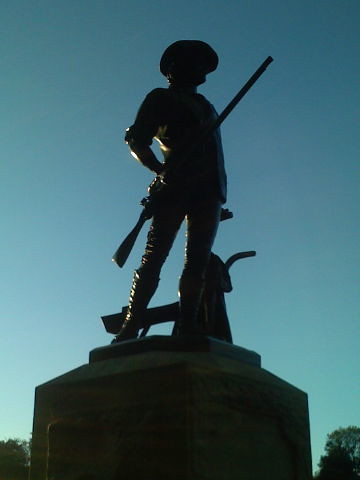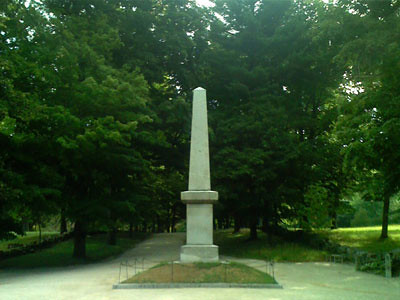 In the Visitor's Center we find "The Hancock", one of the two remaining cannons from the cache that Gov. Gage had sent his men to confiscate. It is on loan from the Bunker Hill Monument in Boston (which commemorates the battle fought on Breed's Hill, but that is a story for another day). Like the other remaining cannon believed to be from the Concord cache, "The Adams", the Hancock is named after one of the two dangerous radical leaders that Gage was seeking. It sits on a recently made gun carriage not unlike the ones found and burned in downtown Concord resulting in the smoke that made the men of Concord fear their town was being burned. Together they represent the triggering causes of the "shot heard round the world", the outbreak of the War that would give birth to one great nation and begin the fall from power of another.
In the Visitor's Center we find "The Hancock", one of the two remaining cannons from the cache that Gov. Gage had sent his men to confiscate. It is on loan from the Bunker Hill Monument in Boston (which commemorates the battle fought on Breed's Hill, but that is a story for another day). Like the other remaining cannon believed to be from the Concord cache, "The Adams", the Hancock is named after one of the two dangerous radical leaders that Gage was seeking. It sits on a recently made gun carriage not unlike the ones found and burned in downtown Concord resulting in the smoke that made the men of Concord fear their town was being burned. Together they represent the triggering causes of the "shot heard round the world", the outbreak of the War that would give birth to one great nation and begin the fall from power of another.All that because Gage feared this weapon and its like in the hands of Hancock, Adams and the bands of insurgents and unlawful combatants who sided with them, to put it in the terms of my earlier postings. All this because rather than treat with men like Hancock and Adams, he and his superiors across the sea chose a preemptive military action, to interdict the radicals and their weapons of war.
But that formulation is all from the point of view of the British, their motives, their mistakes and the strategic failures that they led to. These are important in light of the analogy to our failure to apply the lessons of Concord to modern times, but now let us look at The Hancock and its fellows from the perspective of the Colonists. What does it tell us about their motives and beliefs, about the oft-cited Founding Fathers, their beliefs and assumptions?
To put it bluntly, the Battle of Concord was fought in part over the right of the people to bear arms, and not just pistols, and fowling pieces, but cannons—weapons of war. Gage moved precipitously and disastrously because he did not believe that the weapons of war belong in private hands, a view shared by many Americans today. But what Captain Davis and Private Hosmer died for on the North Bridge was their belief in the right and the need for the people to remain armed. Captain Davis was a gunsmith who drilled his Minute Company with bayonets and shot that he supplied them with, who died defending right of the men of a nearby town to possess cannons, powder, shot and the stores needed to field their militias against a government they found tyrannical.
When we write of Colonel Barrett, Captains Davis and Brown and the other colonial officers, it is easy to think of them as commissioned officers because of the titles of rank the bore, but there is an important distinction between Col. Barrett and Col. Francis Smith, the redcoat who lead his soldiers into Concord, between Capt. Davis and Capt. Walter Laurie who lead the troops on the other side of the bridge. Capt. Laurie, commander of the 43rd Regiment of Foot bore a King's Commission. He was a Captain in the King's army because the King said he was. His authority over his troops devolved to him because he and his superiors were appointed by the King or his appointees.
Capt. Davis was a captain because his fellow citizens in Acton said he was. Capt. Davis was elected. He served his town and his neighbors because he volunteered to and they elected him. His bravery, familiarity with firearms and willingness to supply and train his neighbors qualified him. Before the battle he and Major Buttrick, whose house is just beyond the Visitor's Center, and who drilled his men on the very field upon which the Colonials were gathered, and Capt. Brown, his next door neighbor, whose family watched the battle, and Col. Barrett whose field hid the cannons. They met to discuss and decide what to do because they were responsible not to a distant Governor or more distant King, but to the men who would die following their orders. The men, their neighbors, who elected them to make these decisions.
I stress the distinction between the commissioned officers of the King's army and the elected officers of the colonial militias and Minute companies because it is important in understanding who the cannons belonged to (ignoring for the moment the fact that they may very well have stolen them from the British). They belonged to the People. Even in 1775, before the Declaration of Independence, before the Constitution of the United States of America, these men gathered in Concord believed that political and even military power arose from the people.
The cannons were not Col. Barrett's, not Hancock's or Concord's. The cannon belong to the people. Barrett had them because he was the a senior officer in the people's militia, and was capable, as he proved, of protecting them until they were needed. He needed no authorization from the King, no commission as an officer. Rather he had the trust and respect of the men who elected and followed him, who were willing to die following his orders or those of Capt. Davis or Maj. Buttrick.
That this is so becomes quite clear a little more than a year later when John Hancock, the dangerous fanatic who fled Lexington with Sam Adams a few hours before the fight at the Bridge, and who would become the first Governor of the State of Massachusetts, seventh President of the United States in Congress Assembled, signed a document that declared that
... Governments are instituted among Men, deriving their just powers from the consent of the governed, That whenever any Form of Government becomes destructive of these ends, it is the Right of the People to alter or to abolish it, ...
and
... But when a long train of abuses and usurpations, pursuing invariably the same Object evinces a design to reduce them under absolute Despotism, it is their right, it is their duty, to throw off such Government, ...
And that is the importance of the cannon, since named after him, that lay concealed in the furrows of Col. Barrett's field, and the shot, powder and amassed provisions that were stored in his neighbors' houses. They enabled the people, the militia, to throw off British rule, to revolt against the government that they judged to be despotic.
These men did not believe in the inherent authority of the Commander in Chief and Supervisor of the Unitary Executive to ignore the law, whether he called himself the King and claimed Divine Right or President elected by a minority of the citizenry. They believed in retaining not only their rights, and the right and obligation to revolt. They also believed in the retaining the cannons, the weapons of war, to enable them to exercise those rights and duties to overthrow despots not merely foreign, but domestic.
It is all well and good to try to claim that
A well regulated Militia being necessary to the security of a free State, the right of the people to keep and bear Arms shall not be infringed.
means something else, but as the men who laid down their lives in Concord on Patriot's Day, April 19, 1775, demonstrated, the men who hallowed this ground did so in defense of the right to bear cannon, and the right to revolt. And it was not merely the men of the Commonwealth who believed this. In response to Shay's Rebellion, a little more than a dozen years later the Virginian Thomas Jefferson wrote:
A little rebellion now and then is a good thing. …God forbid we should ever be twenty years without such a rebellion. The people cannot be all, and always, well informed. The part which is wrong will be discontented, in proportion to the importance of the facts they misconceive. If they remain quiet under such misconceptions, it is lethargy, the forerunner of death to the public liberty. …And what country can preserve its liberties, if its rulers are not warned from time to time, that this people preserve the spirit of resistance? Let them take arms. The remedy is to set them right as to the facts, pardon and pacify them. What signify a few lives lost in a century or two? The tree of liberty must be refreshed from time to time, with the blood of patriots and tyrants. It is its natural manure.
And here's the paradox of liberty. This country whose founding documents proclaim the right of revolution, the right of the populace to be armed enabling such a revolution, was the site of a singular event, as a man dressed in colonial garb at the foot of the Concord obelisk pointed out to me yesterday. Twenty two years after the Battle of Concord, John Adams, the cousin of the other dangerous radical who fled with Hancock, was after whom the other cannon is named was inaugurated as President, under the following history making conditions.
- The outgoing Head of State was still alive
- The incoming Head of State was not related to the outgoing
- The turnover was entirely peaceful
- The incoming and outgoing Heads of State disagreed about major policies
- The military was not involved
The country that believed in and was based on the right of revolt—armed revolt—was the birthplace of the entirely peaceful and orderly change of government.
And so, I disagree with those who seek to keep assault rifles and other weapons of war out of citizen's hands, to confine them only to duly appointed representatives of the government. Men died hallowing the ground where I pray in defense of just the opposite.
I met another man on the path of this sacred place, one who disagreed with some of what I have said in this series, who quoted me an old Shi'ite proverb that Iblis, the devil, was the first to reason by analogy, and that underscores the admonition that I usually end my blog postings with: Don't believe me. Read and research for yourself. Think and pray. Discuss with those who not only agree with you, but those who do not. Make your own decisions and act to preserve your country.
Be a Free Voice, the Voice of Liberty
Cry "Freedom!"
Vox Libertas

 I came to this spot, between the two monuments, one month short of the 208th anniversary of the Battle of Concord, on March 19, 2003 to contemplate what brought these two British soldiers to this spot.
I came to this spot, between the two monuments, one month short of the 208th anniversary of the Battle of Concord, on March 19, 2003 to contemplate what brought these two British soldiers to this spot.
